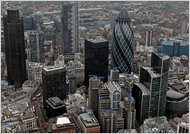 Chris Ratcliffe/Bloomberg NewsThe London financial district.
Chris Ratcliffe/Bloomberg NewsThe London financial district.
LONDON — Britain plans to turn London into a major foreign exchange trading center for the Chinese renminbi to benefit from faster growth in Asia while strengthening the city’s position as a financial center in the wake of the banking crisis.
George Osborne, the chancellor of the Exchequer, said during a visit to Hong Kong on Monday that he was working with Chinese and British banks to establish London as a new hub for the renminbi market.
“London is perfectly placed to act as a gateway for Asian banking and investment in Europe, and a bridge to the United States,” Mr. Osborne said in a speech to the Asian Financial Forum in Hong Kong. “This is not just an accident of time zone, or our language, although both are important. It reflects London’s strength in product development, its regulatory structure, and the depth, breadth and international reach of its financial markets.”
The pledge comes as Britain is increasingly feeling the effects of an economic slowdown across Europe, and some British banks have threatened to move their headquarters abroad in light of stricter financial regulation.
The government hopes that steps toward creating a Chinese currency hub in London will help strengthen the city’s role as a financial center vis-à-vis New York and Hong Kong, while helping Britain attract Chinese investments in other sectors, including infrastructure.
Mr. Osborne said London was already the largest foreign exchange market in the world, adding that the growing use of the renminbi would “bring substantial benefit to Chinese economic development and the wider world economy.”
The Chinese currency’s share of the global foreign exchange market was 0.9 percent in June last year, Mr. Osborne said. That compares with China’s share in worldwide trade of 11 percent in 2010. “It is clear that there is scope for substantial expansion of the renminbi market in the coming years,” Mr. Osborne said.
Sébastien Galy, a foreign exchange strategist at Société Générale in London, agreed with Mr. Osborne that London’s geographical position allowed it to play a role in the expansion of the currency market, but he said it would take time for that market to grow to a sizable volume.
“It could take decades to achieve that, which doesn’t mean that the renminbi wouldn’t increase in trading volumes in the meantime,” Mr. Galy said. “There are regional issues, their markets are not developed enough yet and also you need a floating currency.”
In a first step to expand the currency trading, Hong Kong has decided to expand the operating hours of its renminbi settlement system by five hours. China has been using its currency more in international trade to reduce its reliance on the dollar.
Article source: http://feeds.nytimes.com/click.phdo?i=b4f7bffda1aa3701034258fa8318557e